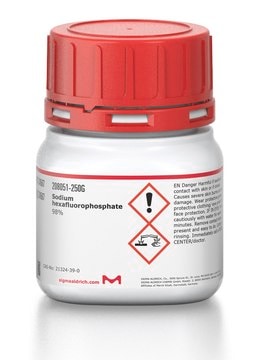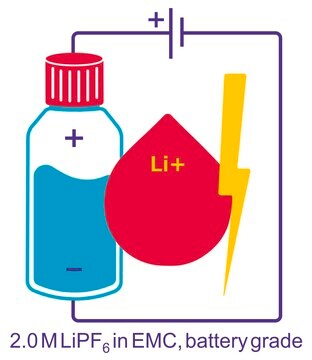201146
Lithium hexafluorophosphate
98%
Synonyme(s) :
Lithium phosphorus fluoride
About This Item
Produits recommandés
Pureté
98%
Forme
powder
Pf
200 °C (dec.) (lit.)
Solubilité
H2O: slightly soluble(lit.)
Densité
1.5 g/mL (lit.)
Chaîne SMILES
[Li+].F[P-](F)(F)(F)(F)F
InChI
1S/F6P.Li/c1-7(2,3,4,5)6;/q-1;+1
Clé InChI
AXPLOJNSKRXQPA-UHFFFAOYSA-N
Vous recherchez des produits similaires ? Visite Guide de comparaison des produits
Description générale
Caractéristiques et avantages
- It can form suitable SEI membranes in electrodes, especially in the cathode
- It can implement passivation for anode current collectors to prevent their dissolution
- Wide windows of electrical stability
- Excellent solubility and high conductivity in various solvents
- Environment-friendly
Mention d'avertissement
Danger
Mentions de danger
Classification des risques
Acute Tox. 3 Oral - Eye Dam. 1 - Skin Corr. 1A - STOT RE 1 Inhalation
Organes cibles
Bone,Teeth
Code de la classe de stockage
6.1A - Combustible acute toxic Cat. 1 and 2 / very toxic hazardous materials
Classe de danger pour l'eau (WGK)
WGK 2
Point d'éclair (°F)
Not applicable
Point d'éclair (°C)
Not applicable
Équipement de protection individuelle
Eyeshields, Faceshields, Gloves, type P3 (EN 143) respirator cartridges
Certificats d'analyse (COA)
Recherchez un Certificats d'analyse (COA) en saisissant le numéro de lot du produit. Les numéros de lot figurent sur l'étiquette du produit après les mots "Lot" ou "Batch".
Déjà en possession de ce produit ?
Retrouvez la documentation relative aux produits que vous avez récemment achetés dans la Bibliothèque de documents.
Les clients ont également consulté
Articles
Solid-state lithium fast-ion conductors are crucial for safer, high-energy-density all-solid-state batteries, addressing conventional battery limitations.
Solid-state lithium fast-ion conductors are crucial for safer, high-energy-density all-solid-state batteries, addressing conventional battery limitations.
Solid-state lithium fast-ion conductors are crucial for safer, high-energy-density all-solid-state batteries, addressing conventional battery limitations.
Solid-state lithium fast-ion conductors are crucial for safer, high-energy-density all-solid-state batteries, addressing conventional battery limitations.
Notre équipe de scientifiques dispose d'une expérience dans tous les secteurs de la recherche, notamment en sciences de la vie, science des matériaux, synthèse chimique, chromatographie, analyse et dans de nombreux autres domaines..
Contacter notre Service technique













